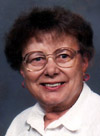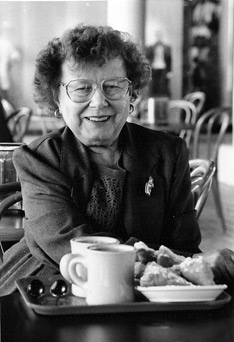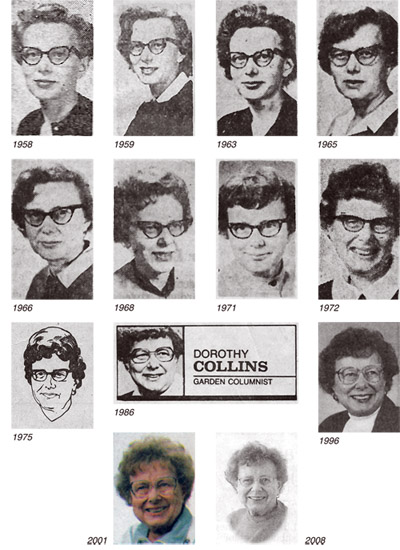Dorothy I. Collins
 Dorothy Irene (Castonia) Collins, veteran regional journalist who wrote more than 2,800 garden articles and columns over a span of more than a half-century, was born in Grandin, N.D., on June 29, 1916, to a farm family. She was oldest of four, daughter of immigrants from French-speaking Quebec on her father's side, and immigrants from Norwegian-speaking Lillehammer on her mother's side. Mathilde (Engeland, changed from Amundson when the family emigrated) and Wallace Castonia's children, Dorothy, Miriam, Gwendolyn and Donald, grew up around the Red River Valley region as the Great Depression pushed the family from farm to farm to make ends meet. They lived in Wheaton, Minn., when Mrs. Collins graduated from high school, in 1934.
Dorothy Irene (Castonia) Collins, veteran regional journalist who wrote more than 2,800 garden articles and columns over a span of more than a half-century, was born in Grandin, N.D., on June 29, 1916, to a farm family. She was oldest of four, daughter of immigrants from French-speaking Quebec on her father's side, and immigrants from Norwegian-speaking Lillehammer on her mother's side. Mathilde (Engeland, changed from Amundson when the family emigrated) and Wallace Castonia's children, Dorothy, Miriam, Gwendolyn and Donald, grew up around the Red River Valley region as the Great Depression pushed the family from farm to farm to make ends meet. They lived in Wheaton, Minn., when Mrs. Collins graduated from high school, in 1934.
Women seldom sought higher education at that time, although Mrs. Collins always excelled as a writer, and was proud of her almost photographic memory of spelling. She did clerical work for the Tintah, Minn., school district, worked briefly as a maid and cook in Minneapolis, then came to Fargo to join National Securities in 1937. The company handled loans for Gambles stores, once a large hardware store chain.
After more than six years there she said she decided the job wasn't going to go anywhere. She had some acquaintances in Los Angeles so, boarding a mostly-troop train with her cousin, Floyd Stephens, she left the Midwest for California.
A few months working for a handbag factory, and Mrs. Collins determined she wanted to play a bigger role in the biggest event of the century, World War II. She enlisted in 1943 in the U.S. Coast Guard Women's Reserve (SPARS). She was stationed first in Palm Beach, Fla., but mostly St. Louis, where she ended her service as Chief Storekeeper in 1946. "The service was one of the few places at that time that treated women equally," she said. "I never felt inferior as a woman in the military."
The military's G. I. Bill also made it possible for Mrs. Collins to undertake a goal she could not consider at age 18: a college education. She loved writing. "I hoped to write short fiction," she said, "But I realized I had to make a living. So I enrolled in journalism." Considering every journalism school in the United States, Mrs. Collins finally settled on the University of Washington in Seattle.
She began her college education in 1948. It lasted one term. "I felt so tired all the time. I remember going on a date to a baseball game. I actually fell asleep during the game. He said, 'you'd better go to the doctor. You might have TB or something.'"
She found that she did, indeed, test positively for tuberculosis. The diagnosis was not a complete shock, however: in the service she had received a "questionable" TB test result. This meant that her TB was ruled service-connected, entitling her for the military disability payments that helped her survive as a single mother during lean years. The TB diagnosis meant a sentence of nearly three years, in Ferland Sanitorium in Seattle.
"I dreaded checking myself into that sanitorium." said Mrs. Collins. "The day I was supposed to go, we drove around and around, avoiding the inevitable. I remember stopping at some fast food restaurant as the last place before I had to go.
Below: Dorothy in New Orleans, 1998.

"Sans" are long defunct today. Most people have never heard of them. Fifty years ago, however, they were common places for TB victims to live for months, perhaps years, and it was hoped recuperate. Mrs. Collins was told she would have to stay six months. She waited a year in hopes the disease would naturally get better. It did not. Finally she agreed to undergo a radical surgery called a thoracoplasty, which required removal of several ribs and collapsing of her left lung, to halt the disease. Recuperation kept her in the sanitorium another year after that.
She said the doctor told her the surgery probably would shorten her life, but that she wouldn't notice the reduced lung capacity in normal day-to-day activities. "He said the only thing I couldn't do was ski or run after buses."
After her discharge in 1950 Mrs. Collins returned to Fargo-Moorhead briefly, where she worked at KVOX-Radio. She thought about transferring to Marquette University that fall, but didn't like the campus, so returned to the University of Washington. There she resumed her active life, serving as editor of the University Daily, and as a campus radio broadcaster. She also resumed smoking her Chesterfields. "They said in the sanitorium they'd rather we didn't smoke, but if that made us too nervous, all right. I wonder if I hadn't smoked, maybe I would have gotten better without the surgery."
Mrs. Collins graduated with a degree in journalism in 1954. She returned to Fargo to give birth to a son, Ross. She was a single mother, and on her own. "I thought it would be better for me to return to this area," she explained, "because my sisters and my mother were here." Her mother Mathilde took care of Ross as the three briefly returned to Seattle. Mrs. Collins spend nearly a year there working for a suburban newspaper. "Then Lloyd Sveen, who was editor of the Moorhead, Minn., Daily News, called to say he had work in Moorhead. I thought it would be better to raise a child there than in Seattle." Her mother continued to live with her until Mathilde's death in 1985.
Mrs. Collins worked only a short time on the struggling Moorhead daily before it folded into the Fargo, N.D., Forum, in July 1957. However, it was at the Daily News that she began writing her garden column, in April 1957. "The editors proposed a garden column, and we offered a contest to readers to name it. The winning entry was 'How Does Your Garden Grow?' Gardening had always been a hobby of mine, so I agreed to write it."
Mrs. Collins took her column to the Forum that year, also joining the news department. It didn't last long. When a features writer for the Women's Section resigned, she was asked to replace her because, well, she was a woman. "I didn't want to, but they said it would only be for a little while, only six months."
Six months turned into more than six years. Mrs. Collins wanted desperately to return to writing news, but it was a time when few female reporters worked on newspapers, and most of those were writing features for what were then called women's departments. Women also were paid less than men. She asked for more money, pointing out she was a single mother, "but they said they were sorry, that's just the way it was."
The times were changing by the last half of the 1960s. Forum Managing Editor Cal Olson finally pulled Mrs. Collins off the women's beat, giving her the job of covering Moorhead schools and courts. "He was shocked when he found out how little my salary was," said Mrs. Collins. "He began to give me raises, raises every three months, until I got in line with the others." Mrs. Collins was the first woman at the Forum to work in general news.
Mrs. Collins continued to write her weekly garden column, also taking workshops to become an accredited flower show judge, and winning boxes of ribbons from her own extensive gardens in south Moorhead. She was one of the few who kept her judging accreditation through more than two decades, and traveled throughout the region to judge flower shows. For many years she judged at the Red River Valley Fair in West Fargo and Clay County Fair in Barnesville, Minn. In 1971 she won the R. L. Wodarz award for contributions to horticulture.
 The 1970s brought her finally to the pinnacle of her career: in 1976 she was chosen as Minnesota Editor. The job required her to cover Minnesota politics, spending several weeks at the state capitol in St. Paul, and attending political meetings and national conventions. It was also the dawn of computer technology in journalism. "I had to bring a big heavy computer called a Teleram. I could hardly carry it, and it was so touchy that you couldn't even walk across a carpeted floor when you were using it. Static electricity would erase your whole story." In 1975 she won the Carol Marx award from Minnesota Presswomen for her contributions to journalism.
The 1970s brought her finally to the pinnacle of her career: in 1976 she was chosen as Minnesota Editor. The job required her to cover Minnesota politics, spending several weeks at the state capitol in St. Paul, and attending political meetings and national conventions. It was also the dawn of computer technology in journalism. "I had to bring a big heavy computer called a Teleram. I could hardly carry it, and it was so touchy that you couldn't even walk across a carpeted floor when you were using it. Static electricity would erase your whole story." In 1975 she won the Carol Marx award from Minnesota Presswomen for her contributions to journalism.
In 1981 Mrs. Collins retired as Minnesota Editor of the Forum, the first and only woman who has held that position for the newspaper. After retirement she continued to write editorials for several years, and kept up her weekly garden column. "I just wanted to keep that little bit of contact with the newspaper," she said. "I always enjoyed writing the column, and didn't want to give it up. And nobody else seemed to want to do it anyway!"
Retirement gave Mrs. Collins the opportunity to set new goals she had no time for during her professional years. One was overseas travel. While she had traveled extensively in the United States as part of family camping vacations, she had never been overseas. In 1980 she and her mother left America for the first time to visit her son, who was completing graduate education in Britain. She returned to England three more times, and also visited France, Holland, Italy, Spain, El Salvador and Guatemala.
At Minnesota State University Moorhead she was able to realize her dream of completing advanced education. She began pursuing Master of Liberal Arts coursework shortly after her retirement. The work included study in Oxford, England, in summer 1984. She was slow to complete her final paper, but with the urging of advisor Mary Ellen Schmider, she graduated with an MLA in 1994. At that time she was oldest person completing an MLA at MSUM--and perhaps the oldest student in Fargo-Moorhead completing any graduate degree.
She continued her numerous volunteer activities, particularly those at St. Joseph's Catholic Church in Moorhead. Mrs. Collins was not raised a Catholic, but during college days dated a Catholic for a while, and met an influential Jesuit priest who persuaded her to convert. She maintained her strong faith since, served in both Catholic Daughters and the first parish council. She also served as member or officer of many local civic groups, including Town and Country Garden Club, F-M Rose Society (both now defunct), Fine Arts Club, AAUW, Soroptimist, F-M Horticulture Society, PEO, Garden Writers of America, Birthright, and United Way of Cass-Clay. In 1975 she was named a YWCA Woman of the Year.
In retirement Mrs. Collins spent weekends at her lake cottage on Big Sugar Bush. But respiratory problems of five decades began to catch up with her. She had quit smoking in 1966, but still, colds and infections affected her lung already weakened by TB so many years ago. By the time she was 85 she used oxygen most of the time, and her world began to shrink: no more trips or gardening. "I really never thought I'd make it this far, after getting out of the san," she admitted. "I remember saying, if only I could live to see Ross graduate from high school."
While she couldn't attend many games, Mrs. Collins did continue to support the F-M Redhawks, buying season tickets. "I remembered the old F-M Twins, and I just thought we ought to have baseball here," she said. And, of course, she continued to write her weekly garden column, sometimes struggling to learn generation after generation of new computer, and email in the last few years. Her last column appeared July 5, the end of a 51-year run. "If I have any regrets," said Mrs. Collins, "I still wish I had found the time to write that short fiction."
Dorothy Collins died August 2, 2008, in Moorhead, at age 92.
The Dorothy Collins Memorial Endowment scholarship fund has been established to help communication majors who also work at the North Dakota State University Spectrum.
Go to Ross Collins home page.
 Dorothy Irene (Castonia) Collins, veteran regional journalist who wrote more than 2,800 garden articles and columns over a span of more than a half-century, was born in Grandin, N.D., on June 29, 1916, to a farm family. She was oldest of four, daughter of immigrants from French-speaking Quebec on her father's side, and immigrants from Norwegian-speaking Lillehammer on her mother's side. Mathilde (Engeland, changed from Amundson when the family emigrated) and Wallace Castonia's children, Dorothy, Miriam, Gwendolyn and Donald, grew up around the Red River Valley region as the Great Depression pushed the family from farm to farm to make ends meet. They lived in Wheaton, Minn., when Mrs. Collins graduated from high school, in 1934.
Dorothy Irene (Castonia) Collins, veteran regional journalist who wrote more than 2,800 garden articles and columns over a span of more than a half-century, was born in Grandin, N.D., on June 29, 1916, to a farm family. She was oldest of four, daughter of immigrants from French-speaking Quebec on her father's side, and immigrants from Norwegian-speaking Lillehammer on her mother's side. Mathilde (Engeland, changed from Amundson when the family emigrated) and Wallace Castonia's children, Dorothy, Miriam, Gwendolyn and Donald, grew up around the Red River Valley region as the Great Depression pushed the family from farm to farm to make ends meet. They lived in Wheaton, Minn., when Mrs. Collins graduated from high school, in 1934.
 The 1970s brought her finally to the pinnacle of her career: in 1976 she was chosen as Minnesota Editor. The job required her to cover Minnesota politics, spending several weeks at the state capitol in St. Paul, and attending political meetings and national conventions. It was also the dawn of computer technology in journalism. "I had to bring a big heavy computer called a Teleram. I could hardly carry it, and it was so touchy that you couldn't even walk across a carpeted floor when you were using it. Static electricity would erase your whole story." In 1975 she won the Carol Marx award from Minnesota Presswomen for her contributions to journalism.
The 1970s brought her finally to the pinnacle of her career: in 1976 she was chosen as Minnesota Editor. The job required her to cover Minnesota politics, spending several weeks at the state capitol in St. Paul, and attending political meetings and national conventions. It was also the dawn of computer technology in journalism. "I had to bring a big heavy computer called a Teleram. I could hardly carry it, and it was so touchy that you couldn't even walk across a carpeted floor when you were using it. Static electricity would erase your whole story." In 1975 she won the Carol Marx award from Minnesota Presswomen for her contributions to journalism.